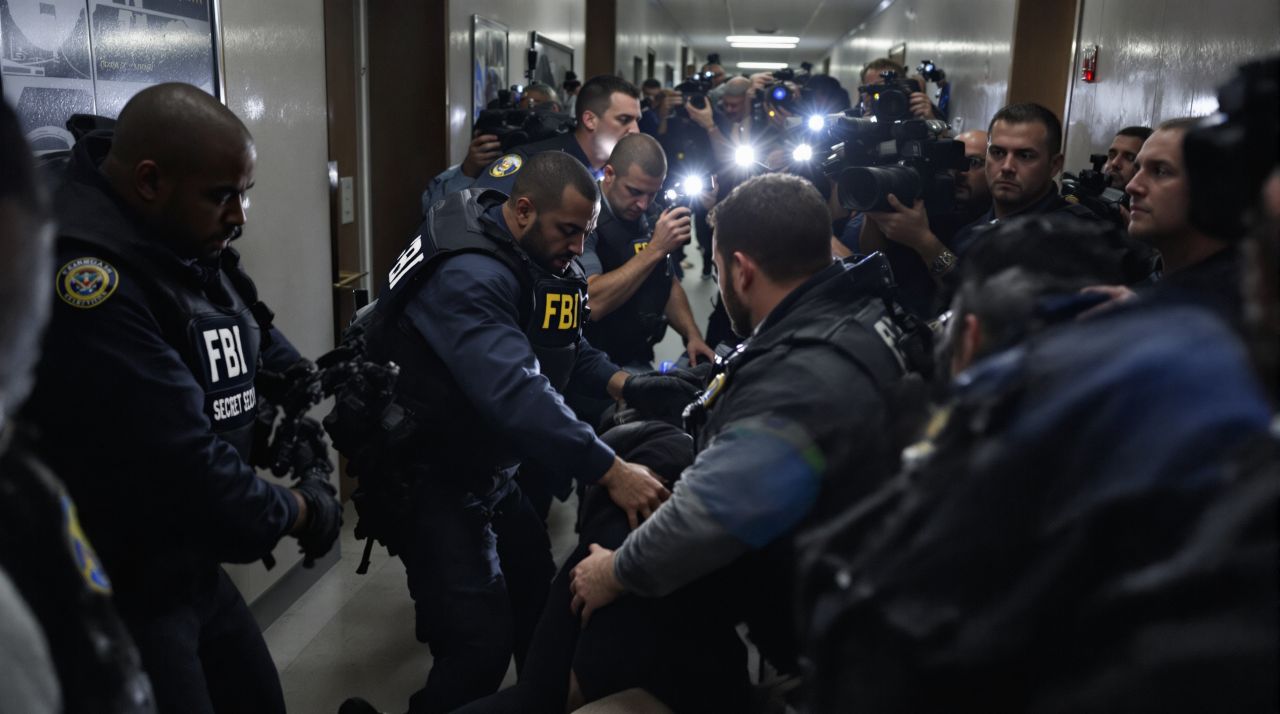
Tensions Boil Over in Los Angeles
It’s not every day you see a sitting U.S. senator forced to the ground and handcuffed by federal agents.
But on June 12, 2025, that’s exactly what happened to Senator Alex Padilla, Democrat of California, in a moment that instantly became a flashpoint in America’s ongoing immigration debate.
The setting was a federal building in West Los Angeles, where Homeland Security Secretary Kristi Noem was holding a press conference amid a city roiling with protests over President Trump’s latest immigration crackdown. The air was thick with tension—outside, demonstrators clashed with law enforcement; inside, the press conference was tightly controlled, with most journalists kept at bay.
Padilla, a Los Angeles native and the son of Mexican immigrants, was in the building for a scheduled military briefing. But when he learned Noem was just down the hall, he decided to attend her event, hoping to get answers about the administration’s increasingly aggressive immigration raids. What happened next was captured on video and quickly ricocheted across social media and cable news.
The Confrontation: “I Am Senator Alex Padilla”
As Noem spoke about “liberating” Los Angeles from what she called “socialist and burdensome leadership,” Padilla could no longer stay silent. He stepped forward, introduced himself, and began to ask about a set of mug shots displayed behind Noem—images federal authorities claimed were of violent undocumented criminals. “I am Senator Alex Padilla. I have a question for the secretary,” he called out, his voice steady but urgent.
Within seconds, plainclothes agents—later identified as a mix of FBI and Secret Service—swarmed Padilla. The video, released by his office, shows him being pushed into the hallway, forced face-down onto the ground, and handcuffed as he continued to identify himself as a U.S. senator. “Why am I being detained?” he asked repeatedly, receiving no answer.
Padilla later told reporters, “I was there peacefully. At one point, I had a question, and so I began to ask a question. I was almost immediately forcibly removed from the room, I was forced to the ground, and I was handcuffed”.
The Fallout: Outrage, Defiance, and Political Theater
The incident set off a political firestorm. Democratic leaders, including Senate Minority Leader Chuck Schumer and California Governor Gavin Newsom, condemned the treatment of Padilla as “outrageous” and “dictatorial.” Newsom, in a post on X, warned, “If they can handcuff a U.S. Senator for asking a question, imagine what they will do to you.”
Padilla himself drew a direct line from his experience to the broader plight of immigrants and workers in California. “If this is how this administration responds to a senator with a question, you can only imagine what they’re doing to farmworkers, to cooks, to day laborers out in the Los Angeles community and throughout California and throughout the country,” he said, visibly shaken.
Republicans, meanwhile, accused Padilla of grandstanding. Homeland Security Secretary Noem claimed Padilla had not identified himself and had “lunged” toward the podium, a characterization contradicted by video evidence and Padilla’s own account. The FBI and Secret Service stood by their agents, insisting they acted appropriately given the “disruptive” behavior and the senator’s lack of a visible security pin.
A Moment That Echoes
Watching the video, I couldn’t help but think of the countless times I’ve seen lawmakers spar with officials in hearing rooms—fiery, yes, but rarely physical. This was different. The sight of a senator, hands behind his back, face pressed to the floor, was jarring. It’s the kind of image that sticks with you, not just for its shock value but for what it says about the state of our politics and the raw nerves exposed by the immigration debate.
For Padilla, the episode may mark a turning point. Once a low-profile senator, he’s now at the center of a national conversation about power, protest, and the limits of dissent in an era of hard-edged enforcement. For Los Angeles, and for the country, the question lingers: If this can happen to a senator, what hope is there for the rest of us?
The Broader Context: Immigration, Protest, and Power
This incident didn’t happen in a vacuum. It comes amid a wave of arrests of Democratic officials protesting immigration enforcement, and as the Trump administration doubles down on its promise to “restore order” in cities like Los Angeles. The city’s mayor, Karen Bass, called Padilla’s treatment “absolutely abhorrent and outrageous,” echoing the anger of many Angelenos who see the federal crackdown as an assault on their community.
In the end, Padilla was released after a brief meeting with Noem, but the images and the outrage remain. The episode is a stark reminder of how quickly the lines between protest, oversight, and confrontation can blur—and how, in today’s America, even the most powerful can find themselves on the ground, demanding answers.
